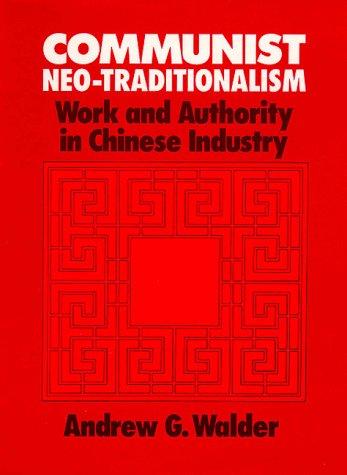Based on official Chinese sources as well as intensive interviews with Hong Kong residents formerly employed in mainland factories, Andrew Walder's neo-traditional image of communist society in China will be of interest not only to those concerned with China and other communist countries, but also to students of industrial relations and comparative social science.
Andrew Walder is the Denise O'Leary and Kent Thiry Professor in the Department of Sociology at Stanford, where he is also a Senior Fellow in the Freeman Spogli Institute for International Studies (FSI). He is currently the Director of the Division of International, Comparative and Area Studies in Stanford’s School of Humanities and Sciences, and in past years has served as the Director of FSI’s Shorenstein Asia-Pacific Research Center. He is the current Chair of Stanford’s Department of Sociology.
A political sociologist, Walder has long specialized on the sources of conflict, stability and change in communist regimes and their successor states. His current research focuses on changes in the ownership and control of large Chinese corporations and the parallel emergence of a new corporate elite with varied ties to state agencies. He also continues his research interest in Mao-era China, with a focus on the mass politics of the Cultural Revolution of 1966-1969.
Walder joined the Stanford faculty the fall of 1997. He received his Ph.D. in Sociology at the University of Michigan in 1981 and taught at Columbia University before moving to Harvard in 1987. As a Professor of Sociology, he served as Chair of Harvard’s M.A. Program on Regional Studies-East Asia for several years. From 1995 to 1997 he headed the Division of Social Sciences at the Hong Kong University of Science and Technology. From 1996 to 2006, as a member of the Hong Kong Government’s Research Grants Council, he chaired its Panel on the Humanities, Social Sciences, and Business Studies.
His recent publications include Fractured Rebellion: The Beijing Red Guard Movement (Harvard University Press, 2009), The Chinese Cultural Revolution as History, edited with Joseph Esherick and Paul Pickowicz (Stanford University Press, 2006), “Revolution, Reform, and Status Inheritance: Urban China 1949-1996," in American Journal of Sociology (2009), “Political Sociology and Social Movements,” in Annual Review of Sociology (2009), “Ownership, Organization, and Income Inequality: Market Transition in Rural Vietnam” in the American Sociological Review (2008), and “Ambiguity and Choice in Political Movements: The Origins of Beijing Red Guard Factionalism,” in the American Journal of Sociology (2006).
http://www.stanford.edu/dept/soc/people/awalder/index.html
 Communist Neo-traditionalismtxt,chm,pdf,epub,mobi下载
Communist Neo-traditionalismtxt,chm,pdf,epub,mobi下载 首页
首页



已经被深深吸引
又买了一次
这本书真的还是很有参考价值的。
非常喜欢